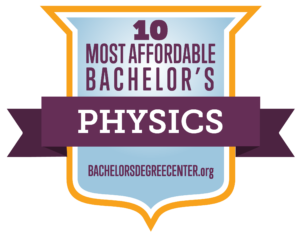
Key Information:
- The University of Washington has the #1 school for an affordable physics bachelor’s degree.
- Graduates are well-prepared for various roles in science, education, and industry.
- Some programs offer smaller classes, which can lead to more personalized attention and better learning outcomes.
For students looking for an affordable degree in physics, there are a wealth of new opportunities in the 21st century. The good news for anyone seeking to obtain a STEM degree in the hard sciences like physics is that employers are far more interested in the student’s ability to perform than they are in where he or she got their degree from. What today’s employers are looking for is capability, expertise, knowledge, dependability, and know-how. Certainly, all of these things with the addition of an advanced degree from an Ivy League school is a plus. But it isn’t an absolute necessity as long as you bring competitive skills to a prospective employer.
In some cases, earning a physics degree from a more expensive school will be the cheaper option in the long term. For example, some of the less affordable physics colleges may have connections to employer networks that pay better, or their tuition assistance could be free or come with lower premiums depending on your background and student history.
Methodology: Ranking the Most Affordable Physics Degrees
For the Bachelor’s Degree Center Most Affordable rankings, editors are concerned with more than just cost. While all programs are presented according to their tuition rate (according to current IPEDS stats), BDC editors also feature only accredited, trusted institutions, so students know they are getting a degree they can count on.
1. University of Washington

The University of Washington has one of the best affordable physics schools, and UW’s department of physics bachelor’s degree program graduates about 175 students each year. Among affordable physics colleges, the University of Washington stands out for its capacity constraint, which caps graduations to 175 students per year. Students first complete a year-long introduction to physics that includes intensive math and science curricula.
The University of Washington graduates 84% of students, which is an extremely high number compared to other schools. The University is located in Seattle, Washington and the rules nearly 30,000 undergraduate learners. fewer than half of those who apply received an acceptance letter, making this a prestigious degree recognized in the area and across the United States.
What We Like: The cap on attendance in the physics department allows professors to get to know students and help them when they’re struggling.
University of Washington Physics
2. University of North Carolina at Chapel Hill

Another one of the best affordable physics schools, the University of North Carolina at Chapel Hill offers a BS and a BA in physics. Similar to other affordable physics colleges, the school strives to keep tuition at affordable levels and offers a bachelor’s of science that is more mathematically intensive than the BA program. The BA program also offers a bit more flexibility for elective courses.
UNC is located in Chapel Hill, North Carolina. This Raleigh area school has over 18,000 students enrolled in undergraduate courses. Only 23% of those who apply are accepted into programs at the school that include biology, communications and psychology. The school graduates a phenomenal 89% of its students, whereas many colleges graduate less than 60% of students.
What We Like: UNC is #7 among the top public universities in America, making it one of the most sought-after schools in the country.
3. Valdosta State University

Valdosta State University is one of the best affordable physics schools. It ranks highly among affordable physics colleges in part due to its smaller upper-level classes. With class sizes averaging 15 students, physics majors can get the individual attention they need to understand difficult concepts. The university hires professors and instructors who openly engage in research and give students an opportunity to serve as assistants. Students also have access to top technologies for hands-on experience.
Valdosta State Has around 7,000 undergraduate students. The school is located in Valdosta, Georgia, and has a competitive acceptance rate of 63%. Those who receive a welcome letter choose majors such as communications, business, and nursing. More competitive admissions standards often correlate to a higher quality of education and challenging coursework.
What We Like: With just over 6 out of 10 students accepted, students should spend extra time on their applications to make sure that they present the best case for themselves that they can.
Valdosta State University Physics
4. Georgia Tech

Georgia Tech is another one of the most affordable physics colleges. A degree from Georgia Tech opens doors in the industry and offer students a degree from one of the best affordable physics schools in the country. GT’s bachelor’s of science in physics help students prepare for graduate programs or entry-level jobs related to the field. Students can also take a concentration or certificate in astrophysics.
Georgia Tech has 14,000 undergraduate students and is located in an urban area in Atlanta, Georgia. This public college accepts fewer than one in five students and majors include mechanical engineering, business and information sciences. Nearly 87% of students who start their studies at Georgia Tech graduate. This is an extremely high average and indicates satisfaction with the school’s academics and amenities.
What We Like: GT is #3 among the top universities in America, promising students a great educational opportunity and high-quality faculty members.
5. University of Wisconsin

The University of Wisconsin is one of the best affordable physics schools. You can get a degree from the department of physics, which has a history of providing the highest level of education. Among affordable physics colleges, the university stands out due to its long history. The first physics graduate received their degree in 1899. The school now offers opportunities were important research and well-regarded academic programs. Students gain a fundamental understanding of the properties of matter, energy and radiation. This provides a framework for further studies in engineering and environmental sciences.
The University is located in Madison, Wisconsin and has nearly 30,000 students at the undergraduate level. Just over half of students who apply are accepted, and popular majors include information science, economics and biology. Nearly nine out of 10 students who begin their education here also graduate from Wisconsin.
What We Like: The school has an A+ niche.com score in diversity, academic, campus life and other categories.
University of Wisconsin Physics
6. University of Virginia

Another one of the best affordable physics schools, the University of Virginia offers a BS in physics that covers a range of majors and they also offer a BA degree. the school ranks highly among affordable physics colleges due to the number of concentrations available in astronomy and physics. There is a very active chapter of the Society of physics students that meets weekly and also has infrequent events. These meetings present talks on topics related to the field and teachers faculty members from different departments at the school. They also have presentations that provide guidance on careers and science.
UVA Only accepts 26% of students who apply. This large public university has 16,000 students at the undergraduate level and the competitive admissions make a degree from UVA valuable and respected. Students also choose majors such as liberal arts and humanities and business. Nearly all the students (94%) who begin their education here graduate.
What We Like: The 26% acceptance rate speaks to the university’s commitment to excellence.
University of Virginia BS in Physics
7. University of Texas at Austin

The University of Texas at Austin is one of the best affordable physics schools available. Consider a degree from this school along with other affordable physics colleges. The department of physics at the school has a leading research-based curriculum. students have exciting opportunities to work directly with faculty members to uncover new discoveries. Students learn how to analyze and conjecture about the nature of the universe. Manufacturers, teachers, lawyers and scientists need strong skills in quantitative analysis, and this program provides that.
UT Austin has nearly 39,000 undergraduate students. Admissions are very competitive with just 39% of students who apply receiving an acceptance letter. Other popular majors include biology, information science and business. The school graduates 83% of students.
What We Like: UT Austin is the #1 ranked top public university in Texas.
University of Texas at Austin Physics
8. University of Michigan

The University of Michigan is one of the best affordable physics schools in the country. Among other affordable physics colleges, this program stands out for its reputation as a research school and its high-tech facilities for research. If you want a degree that offers you several choices for career pathing, this might be the school for you. Undergraduates at the University of Michigan can choose from a BS in physics and in interdisciplinary physics AB or BS. You can also get your teacher certification in physics or take a physics minor at the school.
The University of Michigan is a public University and has over 29 thousand students enrolled in his undergraduate programs. Other majors include business, economics and information science. The school is located in Ann Arbor, Michigan and graduates 92% of its students. This is great news for students who want to go to a stable school with a great reputation.
What We Like: The school ranks #1 among top-ranking public universities in America.
University of Michigan Physics
9. University of California, Santa Barbara

At the University of California, Santa Barbara you can find another one of the best affordable physics schools. This program emphasizes the fundamentals of physics, with classes divided between theoretical and experimental coursework. Along with other affordable physics colleges, the University of California — Santa Barbara offers students a high-quality education for affordable tuition rates. Students take a six-quarter introduction program that takes them through concepts that include mass, time, space, energy, waves, motion, states of matter, plasmas and physics theories from Newton to Einstein.
UC Santa Barbara is based in Isla Vista, California near Santa Barbara. Over 22,000 undergraduate students study at this campus and the competitive admissions mean that only one out of three applications are accepted. That doesn’t seem to stop students from applying to majors such as economics, sociology, and psychology. Also, students who apply seem to be happy with their educational experience as 82% of them also graduate from the university.
What We Like: A 32% acceptance rate and an A rating for campus, academics, values and diversity are stand out features at the school.
University of California, Santa Barbara Physics
10. University of Minnesota Twin Cities

At the University of Minnesota Twin Cities, you can attend one of the best affordable physics schools in the region. It stands out among affordable physics colleges for its flexible, realistic approach to physics. Students emerge from this affordable physics degree program ready to take on careers in applied physics and engineering. Some students go on to study computer applications or obtain a career and secondary education. Others choose to enter the biomedical sciences field. A background in physics is excellent preparation for all these opportunities. Students can also pursue a physics major steeped in the liberal arts.
The University of Minnesota is a highly rated public university located in Minneapolis, Minnesota. It has 30,000 undergraduate students and just over half of applicants are accepted. Other popular majors include biology and psychology. Eight out of 10 students who enroll complete their degrees.
What We Like: The University of Minnesota is the #1 ranked public university in Minnesota.
University of Minnesota Twin Cities Physics
How Do I Save Money on a Physics Degree?
These days, finding a list of the best affordable physics schools will only be a matter of performing a simple Google search. From there, it’s your job to look through all of the relevant information on the schools that come up on your list. Your first consideration, naturally, will be their tuition prices. Does the school you are considering offer scholarships, loans, and other forms of tuition assistance? Does the school have remote classrooms or distance learning?
Your first task is to decide what you want to do with your cheap physics degree. Are you interested in geophysics, cryogenics, fluid mechanics, biophysics, nuclear physics, or some other area of physics? Then, you will look up affordable schools that offer a physics degree in the specialty you’re interested in.
You should do your best to collect as much information as possible on potential affordable physics colleges that you may want to attend. Then, talk to an academic counselor for advice.
How Much Can I Make with a Degree in Physics?
Of course, high on your list of considerations will be how much your physics degree salary will be worth after you graduate. The job that you expect to train for, the connections you are likely to make at a given school, and projected demand for the job you are aiming for will all play a major factor in how affordable your education might be.
If you can demonstrate your ability to earn a high degree in physics salary, then there’s a good chance that the interest rate on any applicable loans may be significantly lower.
As you are probably aware, you can expect to earn a good living with your physics degree jobs salary. The pay range for physics degree holders does vary quite a bit. The bottom 20% of physics degree salaries is $63K a year on average and the top 20% of physics degree salaries is on average more than $200K a year. The remaining 60% of physics degree holders earn an average of $122K per year.
Even at the lowest rung on the physics salary pay scale, you can expect to be well above the common household income in the United States. With numbers like that, you can rest assured that your projected physics degree jobs salary will make your time in college more affordable.
Should I Get a Certificate in Physics Instead of a Degree?
In today’s highly technological world, physics professionals are in greater demand than ever before. That means, attending even free online physics courses with certificate just might be the smartest career move you’ll make this decade.
If you read our section entitled “How Do I Save Money on a Physics Degree?” then you know that the school you attend and the paper you receive on graduation is not the primary consideration that employers make when they hire a physics expert. What they look for is knowledge, competence, and reliability- and you do not need to be a Rhodes Scholar to have that.
The fact is that distance learning, e‑learning, and online certificates are more readily available and more accepted by top quality employers than ever before. You could obtain a physics certificate online that is just as valuable, or more valuable in some cases, than an expensive degree from a four-year brick and mortar college.
There are many online schools that offer free online physics courses with certificate upon completion. Of course, before you seek to obtain a physics certificate online, it is advisable to check the school’s accreditation, reputation, and history of student success.
An online physics certificate could be your ticket to a great job in a vocation that you love. Or online certificate courses in physics could be the perfect addition to your existing training and accomplishments. Online physics certificate programs are a great way to open doors to a career in physics or to advance in your current career path.
With the ever-growing demand for STEM field experts, the question is, can you afford not to earn your online physics certificate or degree?
Related Rankings:
25 Best Bachelor’s in Physics
